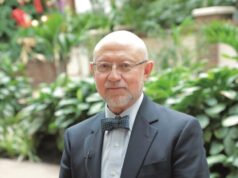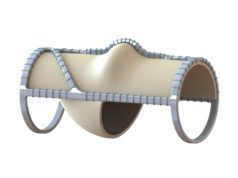Low-dose aspirin prevents recurrent venous thromboembolism and major vascular events in patients with first unprovoked venous thromboembolism, results from the ASPIRE randomised controlled trial, presented at the American Heart Association Scientific Sessions (3–7 November, Los Angeles, USA) have shown. The data were presented by Timothy Brighton, Prince of Wales Hospital, Sydney, Australia.
“Patients with unprovoked venous thromboembolism are at substantial risk for recurrent venous thromboembolism after cessation of anticoagulation,” Brighton said. “We know that long-term anticoagulation with warfarin is very effective at preventing recurrent vein thrombosis, however, many patients are not suitable or do not wish to continue long-term or indefinite long-term anticoagulation. And this is because of the concerns of major bleeding and also of the inconvenience of the therapy.”
Brighton commented: “There has been evidence that low-dose aspirin prevents vein thrombosis in high-risk surgical and medical patients and so we hypothesised that low-dose aspirin might also prevent recurrent vein thrombosis in patients with unprovoked venous thromboembolism. Also, earlier this year, the WARFASA investigators presented data (Becattini et al. NEJM 2012) suggesting that aspirin was effective in this patient population.”
The ASPIRE (Aspirin for the prevention of recurrent venous thromboembolism after a first unprovoked event) trial, Brighton said, was an investigator-initiated study supported by the Australasian Society of Thrombosis and Haemostasis. It enrolled patients with a first episode of unprovoked proximal deep vein thrombosis affecting the popliteal vein or more proximal leg veins, or acute pulmonary embolism in Argentina, Australia, India, New Zealand and Singapore.
The patients received initial anticoagulant therapy and were then randomised in a double-blinded fashion to receive either enteric coated aspirin 100mg daily or placebo. Patients were followed regularly every three months for up to four years.
“We recommended patients to receive six to 12 months of initial anticoagulant therapy, however, patients receiving as little as six weeks and up to 24 months could be enrolled in the study. We asked the sites to randomise the patients and commence the study medication as soon as possible after initial anticoagulant therapy was ceased,” Brighton said.
The primary endpoint of the study was recurrent venous thromboembolism, a composite of recurrent symptomatic objectively confirmed deep vein thrombosis, non-fatal pulmonary embolism or fatal pulmonary embolism. The secondary endpoints were major vascular events (composite of recurrent venous thromboembolism, myocardial infarction, stroke and cardiovascular death) and net clinical benefit (composite of major vascular events, major bleeding and all-cause mortality).
The study randomised 822 patients, and 411 were assigned to placebo and 411 to aspirin. The first patient was enrolled in May 2003 and the last in August 2011. Follow-up was completed in March 2012. The mean age of patients was 54 years, 54% were male and one-third had a body mass index ≥30.
Following anticoagulation therapy for a first unprovoked venous thromboembolism, recurrent venous thromboembolism occurred in 6.5% of patients in the placebo group and 4.8% in the aspirin group (p=0.09). The relative risk reduction of 26% was not statistically significant. There was one fatal pulmonary embolism in each cohort throughout the duration of the study.
Brighton added that “in terms of time to recurrent venous thromboembolism, it is notable that the effect of aspirin was seen very early, at six months; 13.8% of placebo patients and 6.5% of patients assigned to aspirin experienced recurrent venous thromboembolism, and this difference did not change throughout the course of the study. About 20% of the recurrent venous thromboembolism events occurred in patients after they discontinued study medication. This significantly disadvantaged our ability with the intention to treat primary outcome to show an effect of aspirin. We performed two additional analyses to take this into account: one on treatment analysis and a compliance adjusted analysis. These analyses concluded a similar treatment effect, and the on treatment analysis found a 35% relative risk reduction in favour of aspirin for the prevention or recurrent venous thromboembolism and this was statistically significant.”
The rate of major vascular events was lower in the aspirin group. Eight per cent of patients in the placebo group experienced major vascular events, vs. 5.2% in the aspirin group (p=0.01). “We found a 34% relative risk reduction in major vascular events with aspirin,” he said. The differences in clinically relevant bleeding and death rates were not statistically significant. The investigators also found a statistically significant risk reduction in favour of aspirin for the endpoint of net clinical benefit.
In conclusion, Brighton said, “the ASPIRE study, in conjunction with other recently published data, provides consistent evidence that low-dose aspirin prevents recurrent venous thromboembolism and major vascular events in patients with unprovoked venous thromboembolism.” He added, “Aspirin is an effective option for patients who are either unable or do not wish to continue anticoagulation beyond their initial therapy. Aspirin is a simple therapy, widely available, with low cost, well tolerated with low bleeding risks and benefits not solely restricted to prevention of recurrent venous thromboembolism.”












